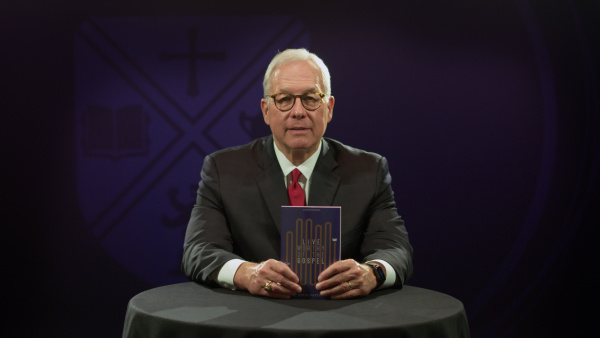PHILIPPIANS 2:12–13
Wherefore, my beloved, as ye have always obeyed, not as in my presence only, but now much more in my absence, work out your own salvation with fear and trembling. For it is God which worketh in you both to will and to do of his good pleasure.
Have you ever been curious about how something works? Maybe you simply Googled it. Or perhaps you watched a video that inspired you to take the gadget apart and see if you could reassemble it. Have you ever thought about how a Christian grows? How does that work? In the next two verses of our study, Paul explains spiritual growth. After presenting Christ as the perfect illustration of the humble mind, the apostle returns to his original theme of living worthy of the Gospel (Phil. 1:27) and describes what enables us to live this way. He has commanded the Philippians to stand fast in the Gospel and to keep a spirit of unity within the church. Now he urges them to complete God’s work in their hearts by obeying these specific commands. Obedience was the spiritual duty of the Philippian believers. Paul’s heart and mind are clear on this matter. He wants them to resolve their interpersonal conflicts and to focus their energies on the progress of the Gospel.
Christ-Centered Motivation
The word wherefore indicates that Paul is applying his exhortation — explained in 1:27–2:5 and illustrated in 2:6–11 — to the local situation. But what specifically are the connections between verse 12–13 and the preceding context? Though several options are possible, the closest link is between Paul’s command that the Philippians obey in the present and the universal homage Christ will receive in the future. If Jesus is the exalted Lord — and He is (2:9–11) — we must live out the salvation that we claim. But there is also a link to Christ’s pattern of obedience (2:8). His mindset must become ours (2:5). And this entire section has the advance of the Gospel squarely in view (1:27). In other words, the motivation for sanctified Christian living comes from the redemptive work, the compelling example and the universal sovereignty of Jesus Christ.
Paul does not distance himself from his readers. He continues with the phrase “my beloved.” The apostle has already stated his love for the Philippians early in the letter: “For God is my record, how greatly I long after you all in the bowels of Jesus Christ” (1:8). He urges them with the thought that they were not merely trying to please him while he was present but were truly intent on living worthy of the Gospel. He appeals to them in love to live for Christ.
Divine Enablement
PHILIPPIANS 2:13
For it is God which worketh in you both to will and to do of his good pleasure.
WORD STUDY
Worketh — to work; to be at work; to be active; to effect; to produce
To will — to wish; to desire; to have in mind; to purpose
To do — same root word as “worketh”
After providing Christ-centered motivation, these verses help us to get a clear understanding of how a Christian progresses in his spiritual life. There are two primary factors that contribute to spiritual growth. First, Christian maturity begins with God’s working in our hearts. Paul wrote, “For it is God which worketh in you” (2:13); in other words, God energizes our spiritual desires. (The words worketh and to do translate the Greek term energeo from which comes the English word energy.) For example, picture your phone charger. Even though you can’t see it, electrical current runs through the cord to recharge your phone battery. You have to recognize that your phone needs charging; the charger does not plug itself in. The power does not come from your choice but rather from the electricity.
Power for the Christian life comes from God. As Gordon Fee explains, “This verb … does not so much mean that God is ‘doing it for (us),’ but that God supplies the necessary empowering. (Our) obedience is ultimately something God effects in or among (us).”[1] And this divine power is related to Christ’s identity as Lord. Paul prayed that the Ephesians might know “what is the exceeding greatness of his power to us-ward who believe, according to the working of his mighty power, which he wrought in Christ, when he raised him from the dead, and set him at his own right hand in the heavenly places” (Eph. 1:19–20). The power God displayed in Christ’s exaltation (Phil. 2:9) is the power He demonstrates in our sanctification (Phil. 2:13).
Spiritual maturity occurs when God gives us holy desires and burdens — to will — to grow. Spiritual discontentment is a grace from God. He stirs us up so we’ll move forward from our current spiritual state, and He enables us to accomplish — to do — everything He has burdened our hearts to do. God has given no commands that believers are unable to obey. God gives us both the power and the desire to fulfill His will, and as Paul had already assured the Philippians, God will complete what He has begun (Phil. 1:6).
Personal Responsibility
PHILIPPIANS 2:12
Wherefore, my beloved, as ye have always obeyed, not as in my presence only, but now much more in my absence, work out your own salvation with fear and trembling.
WORD STUDY
Work out — to do; to achieve; to accomplish
Salvation — an act of rescue or deliverance; preservation
Fear — reverential awe for God
Trembling — quivering; quaking with fear
Second, spiritual maturity also requires active, personal obedience. What does Paul mean when he said, “Work out your own salvation” (2:12)? He wasn’t explaining how someone is saved from his sins. God doesn’t tell us to “work for” our salvation, as if eternal life depends on our good works. God has already achieved our salvation. It is “of God” (1:28). In fact, “No one can work his salvation out unless God has already worked it in.”[2] Therefore, Paul does not mean that we are to “work at” our salvation in the sense that salvation needs our work to be accomplished; rather, it has the idea of carrying out, such as working a longhand division problem to its intended end — the correct quotient. In Romans 7:18 Paul acknowledges that he sometimes failed to carry out God’s salvation as he should.
For I know that nothing good dwells in me, that is, in my flesh; for the willing is present in me, but the doing (working out) of the good is not. (NASB)
The key to understanding the meaning of this command is found in the phrase “as ye have always obeyed.” Paul refers to what believers had been doing in the past — obeying — and compared their past obedience to the present — now. Paul was not directing his call for gospel unity to a congregation that was apathetic or apostate. The Philippians had a track record of participating in the work of the Gospel (1:5), both when Paul ministered among them and after he left (2:12). But they could not be satisfied with the evidences of grace they had displayed in the past. The phrase work out, therefore, means to continue in obedience, bearing present fruit of eternal salvation. In chapter 2 and verse 8 Paul set before them the example of Christ, who worked out His obedience all the way to the cross. In this specific case, Paul commands believers to obey in the matter of unity and harmony: “Fulfill ye my joy, that ye be likeminded” (2:2). In other words, he told them to stop whatever squabbling was going on and to get on with being God’s blameless children in pagan Philippi.
The truth of these two verses (Phil. 2:12–13) also illustrates the general process of spiritual growth, which always depends on our personal obedience. Sanctification is never automatic. Power for the Christian life comes from God. We should not be slow to strive for holiness through faith-filled, Spirit-empowered effort. God did not save us by our works, but He did save us “unto good works” (Eph. 2:8–10). Christian fruitfulness is the result of amazing grace. Theologian John Murray explains, “The more persistently active we are in working, the more persuaded we may be that all the energizing grace and power is of God.”[3] On the other hand, the absence of spiritual progress in our lives is due to our active resistance of God’s energizing power.
The phrase “with fear and trembling” further confirms that spiritual growth is conditional. The word fear describes respect for God, so that we will never want to disobey Him. The word trembling conveys the idea of personal distrust in one’s abilities because of the possibility of failure. It is with these attitudes that we should approach our spiritual growth, along with an urgent commitment to obedience. The mighty acts of God in salvation and judgment should leave us awestruck, not petrified of a vengeful God, but willing to go to any length to bring Him pleasure.
It is no coincidence, then, that the ultimate result of our growth is God’s pleasure (2:13). Spiritual maturity into Christlikeness pleases the Father. He takes delight in our humble attempts to obey, feeble as they may seem. God expects and enables the reverent obedience of His people.
Conclusion
Some Christians have wondered if verses 12 and 13 contradict each other. How can you be responsible to live out your faith if it is really God who is at work? But Scripture consistently holds these two truths together: God’s grace and man’s responsibility. They are compatible, not contradictory. That is why throughout Paul’s letters we find statements of fact about God’s grace interwoven with commands that we must obey. The Christian life is all of grace, and yet we must make every effort to please the Lord.
[1] Gordon Fee, Paul’s Letter to the Philippians, The New International Commentary on the New Testament (Grand Rapids, MI: Wm. B. Eerdmans Publishing Co., 1995), 237.
[2] James Montgomery Boice, Philippians: An Expositional Commentary (Grand Rapids, MI: Zondervan Publishing House, 1971), 162.
[3] John Murray, Redemption: Accomplished and Applied (Grand Rapids, MI: Wm. B. Eerdmans Publishing Co., 1955), 158.
This post is from Live Worthy of the Gospel: A Study in Philippians by Steve Pettit. Copyright 2016 by BJU Press. Printed by permission of BJU Press.
This post is part of the study designed to correspond with the 2020 Fall Chapel Series. Watch the chapel message below:
Join us for chapel via live webcast at 11 a.m. every Monday and Wednesday.








